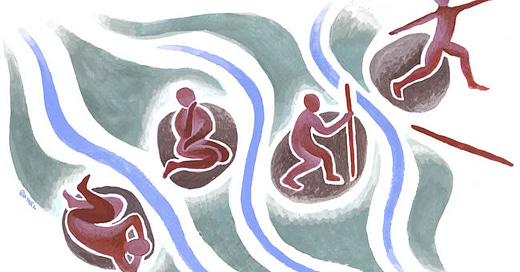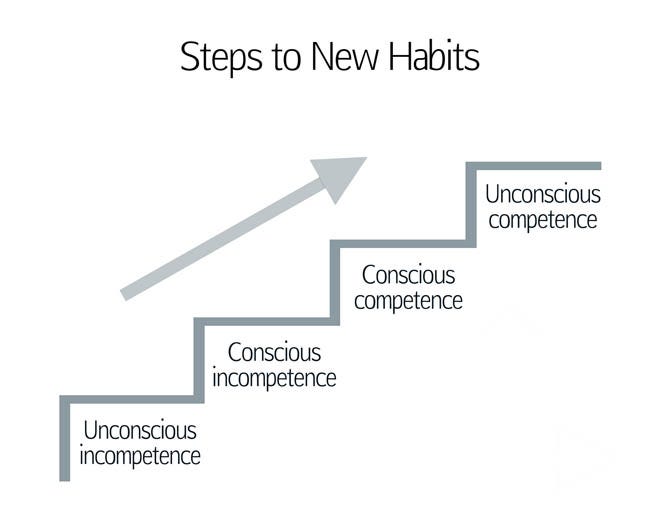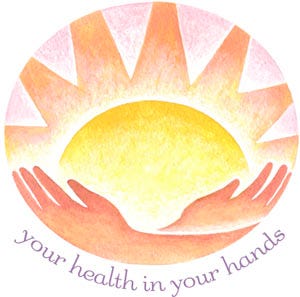Illustration © D. Yael Bernhard
This is the season when people are forming new resolutions and trying to create better habits, many having to do with health. Health habits are a form of behavior. When people resolve to reach a health goal - whether to eat more vegetables, establish exercise routines, lose weight, lower cholesterol, reduce sugar, or improve their energy or sleep patterns – it’s a matter of putting a new habit in place. This isn’t easy! Good intentions are a great start, but aren’t enough by themselves to reach your goal.
In my training as an integrative health coach at Duke University, the focus was on the psychology of behavior change. It’s all about breaking the process down into attainable, actionable steps. We were given a handout that looked like this:
Many people find this breakdown comforting. It reassures us that it’s okay to start where we are. Acquiring any new skill or habit begins with lack of awareness, and progresses from there. We wake up from complacency, and realize what needs to be done. Then we consciously seek out the necessary resources to move forward, make a plan, and go. Much like climbing a mountain, the process of establishing a new habit involves finding the necessary equipment, packing the right provisions, checking the weather forecast, and following a good map. Along the way, obstacles may arise that impede your progress. You might encounter a storm. Is there a lean-to on your trail where you can take shelter? You might have to cross a stream. How will you get across?
We were encouraged to use metaphors with our clients. What you can imagine, you can put into practice. What better metaphor than stepping stones? I decided to illustrate this idea. In the image above, the figure on the left is daydreaming, unengaged with future goals. The second figure is roused and thinking, gathering information and setting intentions, but not yet taking action. The third figure has found a walking stick to use as a supportive aid, and is starting to get up and move. This support, symbolized by the walking stick, comes from the stream itself – the individual situation. The fourth figure has successfully reached the other side. The new habit has become second nature, and the walking stick is no longer needed.
Of course, the illustration greatly condenses the process. The two middle steps take a lot of energy, and the passage of time. This is where support can make a real difference. The expanse of a stream may be too wide to leap across, but if it’s broken down into smaller steps, it becomes doable. These are simple concepts, but there are endless ways to apply them. Every brain is different, and everyone has their own style of learning, their own walking stick that emerges from the challenge itself. This is why I’m not writing a list of tips for making changes. Most people have resources from previous experiences that may be applied to their present challenge. Health coaches are trained to draw these out, to help the client anticipate potential obstacles, and to brainstorm about how to cope with those obstacles. It could be as simple as removing all junk food from the kitchen before starting a new diet, or figuring out when you can stop by the gym to sign up for an exercise class. These small steps add up. Fitting them into your busy schedule can be a significant obstacle. Time management often comes up as an important subject.
Just as repeating a new word in a foreign language a certain number of times commits it to memory, repeating a new behavior forges new neural networks. Research on behavior change varies widely, with estimates of anywhere from 25 to 400 to a million repetitions necessary to learn something new. Health coaches think more in terms of time – usually 3 to 6 months. Regardless, it takes patience and persistence to reach your goal. Having realistic expectations keeps confidence levels up. We check in often about that, learn what boosts our confidence, and talk about our doubts. We find objective ways to measure success, and plan specific rewards for reaching milestones along the way.
Stating intentions can be powerful. In learning a new language, it helps to speak out loud, and to have someone to dialogue with. In establishing a new habit, it helps to have an accountability partner, whether a health coach, a health coaching group, or a supportive friend. Understanding the values that drive these intentions is even more powerful – for like a compass, our values are what keeps us heading in the right direction and feeds our motivation to take the next step. I want to be able to play baseball with my grandson may drive a commitment to undertake aerobic training, or to make dietary changes to reduce arthritic inflammation. Acting in accord with our values is what makes people happy. The beautiful thing is that one change in health behavior often leads to another – in this example, aerobic conditioning and reduced inflammation may result not only in better mobility to play sports, but also healthier cholesterol and a reduced risk of cognitive decline and diseases such as type 2 diabetes, IBS, hypertension, and even cancer. Lifestyle choices are a major underlying factor in the chronic diseases that constitute a major challenge in the American healthcare system today. Yet most chronic health problems are preventable. Health coaching helps people apply lifestyle choices that lead to healthy outcomes.
Many New Year’s traditions around the world focus on letting go of the old year as much as welcoming the new. This is done symbolically by burning effigies (Russia), breaking crockery (Italy and other parts of Europe), using noisemakers to chase the old year away (Bali), or slamming doors to “shut out” the old year (West Africa). Similarly, establishing new health behaviors is a matter of both letting go of old habits and creating new ones. It’s important to remember that the old habit will coexist with the new one until enough time and repetition has taken place for the new to overwrite the old. You might not feel like you’re gaining traction in the beginning. Therefore, setting a timeline for establishing a new routine is helpful. With time and support, the new habit gradually becomes the new normal.
In the end, a new behavior may become unconscious. It feels so right and natural, it doesn’t require further thought. A new mother may be awkward at first in handling her infant, but with practice her ability to handle the child safely and securely comes automatically. For me, giving up sugar was difficult at first, but after a few weeks it got much easier; after a few months, it became effortless – and now, after almost two years, I don’t miss sugar at all or even think about eating sweets. I’m just happy I was able to reverse my pre-diabetes. I’m on auto-pilot, and that’s the ultimate goal.
Of course, at age 62 I do have other health issues, and new goals for the coming year, mostly having to do with reducing stress and chronic back pain. One of my values that helps me is my firm belief that change comes about gradually, cumulatively – and gently (see my article, Your Adaptogenic Allies for more on this subject). Therefore, I only have to take a small step each day. I also know our brains are made to assimilate new information. We really can establish new habits that serve our health goals. It’s incredibly rewarding – you gain so much more than you give up.
And I love watching the process unfold.
For more information about individual or group health coaching, please respond directly to this post, or email me at dyaelbernhard@protonmail.com.
Goodbye, 2023! May 2024 be the year you establish new habits that truly serve your health. You can do it! You have tremendous power over your own well-being and longevity. No one can climb that mountain for you – but you sure can get a lot of help along the way.
With good wishes for your journey –
Yael Bernhard
Certified Integrative Health & Nutrition Coach
Yael Bernhard is a writer, illustrator, book designer and fine art painter with a lifelong passion for nutrition and herbal medicine. She was certified by Duke University as an Integrative Health Coach in 2021 and by Cornell University in Nutrition & Healthy Living in 2022. For information about private health coaching or nutrition programs for schools, please respond directly to this newsletter, or email dyaelbernhard@protonmail.com. Her art newsletter, “Image of the Week,” may be found here. Visit her online gallery of illustration, fine art, and children’s books here.
Information in this newsletter is provided for educational – and inspirational – purposes only.







